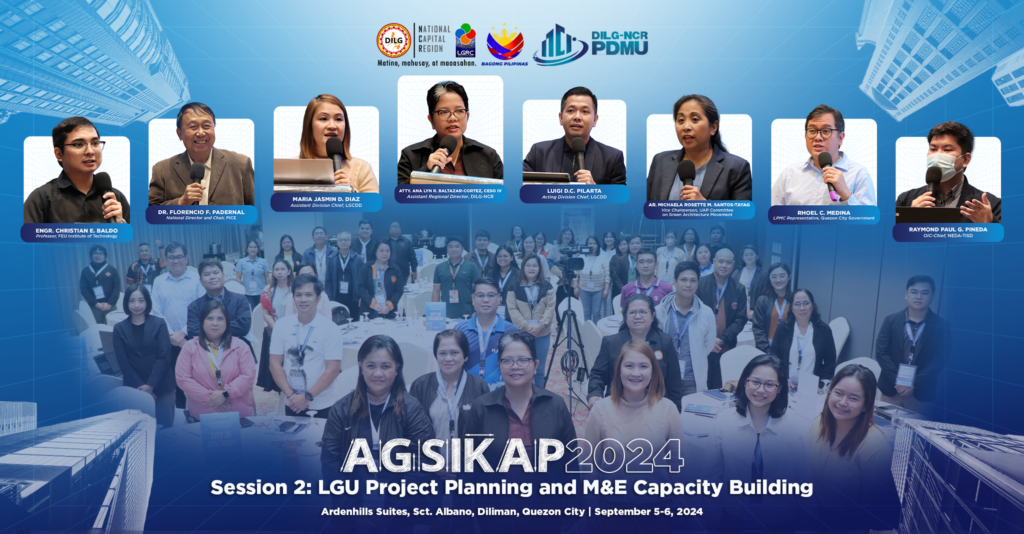
The Department of the Interior and Local Government – National Capital Region (DILG-NCR), through the Project Development and Management Unit (PDMU), conducted the second session of this yearâs Apprising Government Employeesâ Skills on Infrastructure Projects and Knowledge on Monitoring and Evaluation, and Performance (AGSIKAP) on September 5-6, 2024 at Ardenhills Suites, Diliman, Quezon City.
Designed to strengthen the capacity of NCR LGUs in project planning and monitoring, the two-day activity was attended by City Engineering and Planning Officers, select CSO Representatives from Local Project Monitoring Committees (LPMCs), and Local Government Support Fund (LGSF) and Results-based Monitoring and Evaluation of LGU Infrastructure Projects (RLIP) Focal Persons of the DILG Field Offices.
In her opening remarks, DILG-NCR Assistant Regional Director Atty. Ana Lyn R. Baltazar-Cortez, CESO IV shared how rapid urbanization has brought about significant changes in the field of project management, highlighting NCR LGUsâ ongoing efforts to find effective solutions to such emerging challenges.
âOur demands in the Capital have been continuously increasing despite limitations in resources and allocations; but one thing has remained consistent all throughout â our initiatives. Our initiative to build a city of progress; our initiative to uphold transparency and accountability; and our initiative to establish a credible project planning and monitoring unit. All of these, binded by our commitment to public service, will determine the development of our LGUs,â Atty. Baltazar-Cortez stated.
Afterwards, DILG-NCR Local Government Capability Development Division (LGCDD) Assistant Chief Maria Jasmin D. Diaz explained that the second session of AGSIKAP 2024 aims to guide LGUs on the process of filling out RPMES forms; apprise LGUs on the process of conducting a comprehensive backcasting of recurring issues in project planning and monitoring; and ensure vertical alignment of locally-funded projects to various development goals set forth by local and international organizations.
For the first lecture, Raymond Paul G. Pineda, OIC-Chief of the National Economic and Development Authority (NEDA) Transport Infrastructure Sector Division, discussed the legal bases and conceptual framework of the Regional Project Monitoring and Evaluation System (RPMES). He also provided a thorough walkthrough of completing RPMES Forms and underscored the importance of optimizing such forms for increased efficiency, improved accountability, enhanced decision-making, and the development of evidence-based practices in the implementation of LGU infrastructure projects.
Quezon City Project Monitoring Committee (QC-PMC) Representative and Planning Officer II Rhoel C. Medina then shared the best practices of the said LGU in monitoring and evaluation, particularly in utilizing RPMES Forms to ensure the effective execution of city-level projects. These include the utilization of available technology for wider accessibility; customization of certain parts of the RPMES Forms for easier alignment with other documents; conduct of training on the use of the LGUâs Results Based Monitoring and Evaluation System (RBMES); and participation of civil society organizations (CSOs) in the QC-PMC monitoring process.
Following this, Engr. Christian E. Baldo of the Far Eastern University (FEU) Institute of Technology expounded on the concept of backcasting, a planning method that aids in identifying barriers in project implementation and developing solutions to achieve urban sustainability. He also facilitated a visioning workshop where participants were able to apply the backcasting framework to the operations of their respective LGUs.
During the second day, Dr. Florencio F. Padernal, National Director and Chair of the Philippine Institute of Civil Engineers (PICE) Specialty Division on Project Management and Construction, delved into the basics of conflict resolution in the context of project implementation and construction management. He shared in detail various strategic approaches in resolving conflicts, which include having open communication, problem solving, negotiating, setting boundaries, and acting decisively.
Finally, United Architects of the Philippines (UAP) Committee on Green Architecture Movement Vice Chairperson Ar. Michaela Rosette M. Santos-Tayag provided a comprehensive discussion on building sustainable cities anchored on glocal development plans. Specifically, Ar. Santos-Tayag presented the fundamental principles of green buildings, as well as its coverage and performance standards based on the Philippine Green Building Code.
In closing, LGCDD Acting Chief Luigi D.C. Pilarta stressed on the vital role of City Planning and Engineering Officers and LPMCs in driving social change through the effective implementation of locally-funded projects. He then expressed his gratitude towards the participants for their unwavering support to the DILG-NCR and its mission to build sustainable cities in the National Capital Region.
The AGSIKAP serves as the primary platform of the PDMU-NCR for various capacity-building activities aimed at enhancing the knowledge and skills of NCR LGUs with LGSF projects. The remaining two (2) sessions of this yearâs AGSIKAP are expected to be held in October 2024.
